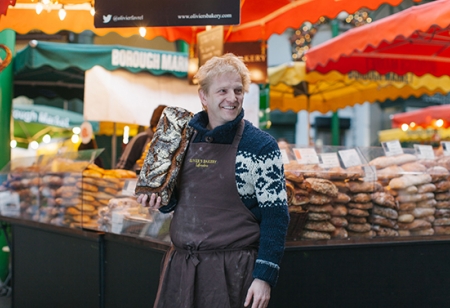
In a regular series that explores the story and philosophy of the Market’s Slow Food approved traders, this month we talk to Olivier, owner of Olivier’s Bakery.
“You cannot accelerate. You cannot cut corners. You can only follow the process until it is ready.” Bread is the definitive slow food. It is the staff of life, its religious and cultural resonances extending beyond the dinner table and over the course of human civilisation, which it largely fuelled.
Making it is—or should be—a long and intensive process: “About 10 or 12 hours. Minimum,” Olivier of the eponymous bakery continues passionately. It needs to be mixed slowly, 25 minutes on a slow speed, and it needs time to ferment, or prove. It needs to be cared for.
“I fell in love with the way bread can be created from almost nothing. Flour does not have a great taste on its own, but if you process it with water, salt and time, each flour has its own taste and aroma,” he continues. “That is the beauty of it”—and yet, he continues sadly, for the vast majority of bread consumed in this country, that isn’t true.
Naturally occurring
For one thing, in order to achieve such ‘efficiency’ when it comes to bread, factories need to use a host of ingredients our ancestors would not have heard of, let alone used: reducing agents, emulsifiers, soya, preservatives and, most pertinently in an age of rising gluten sensitivity, added gluten, on top of that naturally occurring in flour.
For another, by reducing the mixing time for the dough from 25 minutes to seven or eight, Olivier says, “you get a much stronger chain of gluten. It is harder for your body to break down.” It’s why even people without gluten intolerance can feel bloated after eating a cheap white slice.
But this is not an article about intolerances and their origins: this is about Olivier’s bread, and the Slow Food principles which are inextricably woven into its soft, stretchy dough.
Local bakery
Olivier has been baking like this for decades. He first learnt aged just 14 as an apprentice patissier in the local bakery in France where he grew up. His famed almond croissant “is still the same recipe that master baker taught me.”
His philosophy that “there is nothing more beautiful than creating honest food and making people happy,” starts with the ingredients list: entirely organic, and sourced as locally as possible—even down to the butter, about which the French are famously protective.
“I could buy French butter, which has been especially made for viennoiserie,” he points out, “but we are here. We need to support the local area wherever we can.” Good ingredients start with the farmer: “They’re the ones who create what we need to do our duty.”
Ethically sourced
Using unsalted butter made on an artisanal scale, from milk that’s ethically sourced from pasture-fed cows in Britain, is just one way in which Olivier can support the local economy, without compromising flavour (his almond croissant will vouch for that).
Another is his impeccable sourcing of flour. “All our flour is organic and stone ground in Shipton Mill,” a mill in Gloucestershire dating back to medieval times. It’s British where possible—sadly the supply is not always reliable enough, because of the weather,” Olivier says—but it is always stone ground.
This is crucial, especially so far as ‘slow’ is concerned: the stone grinding of wheat is as old as bread itself, and as tedious. Little has changed in principle: “It simply can’t be sped up because the wheat will be burnt. It’s a slower process: the wheat keeps a lot more of the nutritional value and a great deal more flavour,” Olivier enthuses, “so it’s better all round—and we know exactly what’s gone into it, too.”
Dense loaves
With no added soya or gluten, it is entirely in the hands of the baker to effect the miracle of transforming soft powder to dense loaves. “Every week we receive a different batch of flour, and every week we need to think, ‘how does this flour work?’“ Being the product of the soil and the weather, each batch will react slightly differently to water, yeast and temperature.
“We need to adapt,” Olivier explains, and they do every week, because that’s baking as Olivier knows it. “If you use a flour that is already processed and controlled, you don’t need to worry so much. You just follow the same process—but then, if I was to change my ways in order to make more money and be more efficient, I’d have done so years ago.”
Nowhere is the fact Olivier hasn’t sold out to mammon more in evidence than at his Borough Market stall. Whether it’s a croissant taster, a top tip for home baking, or a discounted loaf sold at the end of the day, Olivier and his staff are notably generous: “Bread was one of the first foods to be shared between people, and that is what we try to teach.”
Change in attitude
He welcomes the change in attitude among British bread buyers—from individualism, to one of sharing. “When we first started they just bought small loaves for one. Now they buy bigger, for family, friends, neighbours.” We ask about ingredients; we ask about processes; and we place bread where it belongs—at the centre of a food filled table from which everyone can pick, pull, tear and share.